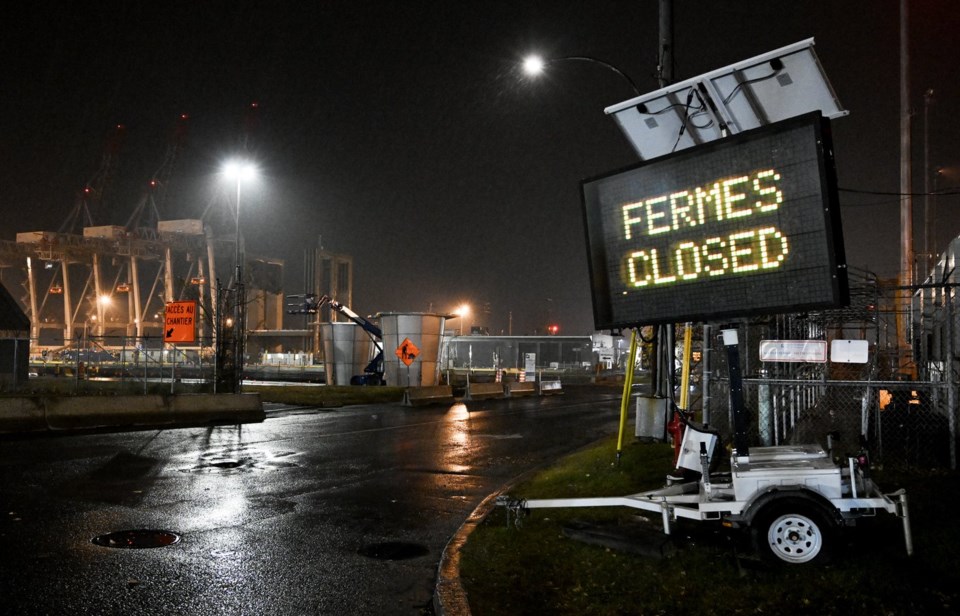Here is a roundup of stories from The Canadian Press designed to bring you up to speed...
Montreal dockworkers reject latest offer
The union representing some 1,200 dockworkers at the Port of Montreal has overwhelmingly rejected a deal with their employers association, and a lockout at the facility is underway.
A spokesman for the Canadian Union of Public Employees says members voted 99.7 per cent to reject the latest offer.
“The hostile offer was rejected because the employer refused to negotiate," said Michel Murray, union advisor with CUPE, in a statement late Sunday. "Nothing in the offer reflects the union’s demands."
Workers have been without a collective agreement since Dec. 31, 2023.
The Maritime Employers Association said in its own statement that it "deplores the negative outcome of the vote" and has no choice but to declare a lockout.
As a result, the employer said dockworkers are locked out as of 9 p.m. Sunday with only essential services and activities unrelated to dockworkers continuing at the port.
Here's what else we're watching...
Liberals to face third test in federal byelection in British Columbia next month
Prime Minister Justin Trudeau announced voters in Cloverdale—Langley City will pick their next member of Parliament on Dec. 16.
The byelection in British Columbia will be a third test for the Liberals, who have already lost two long-held seats in the last several months.
The successive byelection losses and dismal poll numbers have inspired public calls from inside and outside of Trudeau's caucus for him to resign as party leader.
Running for the Liberals is Madison Fleischer, a local business owner and community leader.
Federal Conservatives hope to retake the riding with their candidate Tamara Jansen, a former MP who held the seat from 2019 to 2021.
First Nation wants consultation on wind projects
A First Nation near Quebec City says the provincial government and Quebec’s hydro utility have ignored their constitutional duty to consult about four planned wind projects south of the St. Lawrence River.
The claim is part of a long-running territorial disagreement between the Huron-Wendat Nation, the Quebec government and neighbouring First Nations, and it comes as Hydro-Québec looks to triple the province’s wind power capacity in co-operation with Indigenous communities.
The dispute has its roots in a treaty, signed in 1760, that protected Huron-Wendat rights but didn’t define their territory. More than 260 years later, that uncertainty could have consequences for a new era of energy development in Quebec.
The Huron-Wendat Nation filed an application in June asking the Quebec Superior Court to order the provincial government and Hydro-Québec to consult with it about four proposed wind farms east of Quebec City.
The First Nation says it’s looking to resolve a decades-long problem. It accuses the government and Hydro-Québec of the “systematic and continuous practice” of keeping the Huron-Wendat “in ignorance as to the projects and measures they are considering” in the southern part of its territory.
But the Wolastoqiyik Wahsipekuk First Nation, which is a partner on the four wind projects, argues there is no obligation to consult the Huron-Wendat. The First Nation, formerly known as the Maliseet of Viger and based near the small city of Rivière-du-Loup, says the projects are located on its ancestral territory south of the St. Lawrence River.
N.S. election: Are air conditioners a basic need?
As Nova Scotia politicians make their fall election promises, Julie Leggett is urging them to commit to helping people on income assistance stay cool during heat waves.
The resident of New Glasgow, N.S., recently won an appeal board decision granting her a $450 reimbursement for an air conditioner, and she's hoping the victory will become a wider policy in the Department of Community Services.
The 44-year-old bought the air conditioner with a loan from a friend this summer because she couldn't face another stretch of weeks during which the heat increased her chronic pain and added complications to her multiple sclerosis.
However, the Department of Community Services refused to pay for the unit, leading her to make her case before the Assistance Appeal Board.
In an Oct. 22 ruling, board member Wanda MacDonald agreed with Leggett that the medical conditions she experiences are made worse by the blasts of high heat that can sweep across the province in July and August.
Air conditioners are not explicitly on a list of "special needs" that people on income assistance in the province are eligible for, according to an email from the department.
However, MacDonald noted in her written ruling that Leggett had provided medical information showing how heat could worsen her chronic pain and other health conditions. The adjudicator concluded Leggett met the regulation's criteria that the item requested — the air conditioner — "is essential for health."
How much does Canada owe in climate aid?
This year's international climate talks are expected to be headlined by fraught negotiations over how Canada and other wealthy countries, who have contributed a disproportionate share of planet-warming emissions, should financially compensate other nations in their fight to tackle climate change.
Many pressing questions for negotiators are on the table: How much should those wealthy countries pay? Which countries will have to contribute? And how should the money be provided?
The answers may determine just how much money developing countries could receive for everything from renewable energy projects to wetlands conservation.
Failure to achieve a new goal at the United Nation's annual climate talks may undercut confidence in major international agreements and strike a blow against efforts to limit global warming, observers say.
"It's pretty high stakes," said Bill Hare, CEO of Climate Analytics, a Berlin-based climate think tank.
This report by The Canadian Press was first published Nov. 11, 2024.
The Canadian Press




